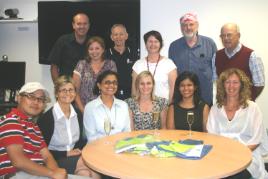Noosa a hotbed for doctoral students
Published on 03 May, 2012
The Sunshine Coast could host the next education revolution with a dozen new CQUniversity doctoral students preparing to tackle teaching theory's toughest challenges...
The changing role of homework, parents' impact on early childhood learning and the influence of digital technology are just some of the dilemmas on the agenda for the Noosa Campus-based students, who presented their confirmations of candidature recently.

Research students and supervisors gather in Noosa recently
And with Noosa's12 new doctoral students now making up one third of all CQUniversity Research Higher Degree (RHD) entries this year, their induction is further proof the campus is fast becoming the Coast's research hub.
CQUniversity Pro Vice-Chancellor Professor Kevin Tickle said fostering high level study would give the University access to ground-breaking research critical to the future of Australian education.
"Doctoral studies enable students to push forward the frontier of human knowledge," Professor Tickle said.
"They study a specific subject in such great depth that they are capable of becoming the world's foremost expert in their particular field.
"As a result, CQUniversity will have immediate access to solutions to complex educational problems, such as the improvement of teaching or a new understanding of how students learn.
"And by facilitating educational research, our students are given more opportunities to publish their findings and continue to build on their knowledge.
"As the current RHD students achieve their goals we expect to see even more students undertaking higher education studies based at the Noosa Campus."
This year's intake will also be among the first to take advantage of a new Education Flagship research centre, constructed during the Noosa Campus' recent $2.5 million expansion.
Among them is high school math teacher Maria Casey from Brisbane who is exploring the connection between student mathematical learning and the use of online communication technology.
"The amount of digital hardware in schools is steadily increasing and my research revolves around how to best integrate its use into classroom learning," Ms Casey said.
"Current students are able to use technology much more intuitively than older generations - today's students use it in a way most adults don't even understand.
"They are tending to use it to network and form relationships, as opposed to older generations who use technology as a tool to perform tasks.
"Through my research I hope to gain a better understanding of the benefits and impacts the use of technology in the classroom will have on students and teachers."

